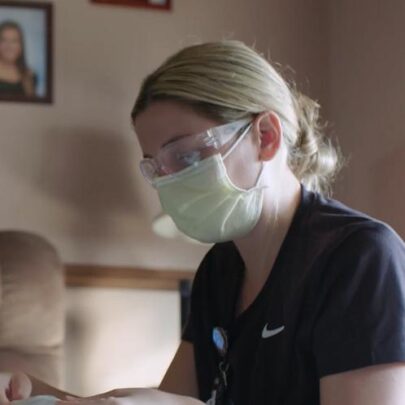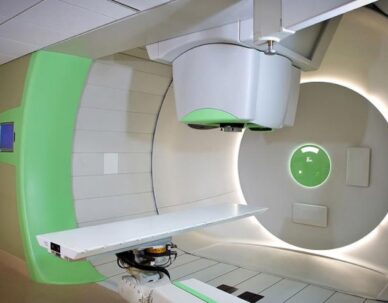PC3I’s Cancer Care @ Home Challenges the Status Quo: “Why Not Here?”
April 30, 2021
“You can’t really quarantine from cancer treatment.”
Liz Kim shared this sentiment in a three-part Medscape documentary series highlighting PC3I’s Cancer Care @ Home initiative. Kim, who was diagnosed with breast cancer shortly before the COVID-19 pandemic hit the United States, underwent much of her treatment in her own home.
The onset of the pandemic added urgency to bringing appropriate injections and infusions to the homes of patients with cancer. A PC3I team had been exploring cancer care in the home since November 2019. As the team reviewed established programs in the UK, Australia, and Europe, they wondered, “Why not here?”
For many patients with cancer, going to the hospital or clinic presented challenges even before the pandemic. There are the logistics of travel, wait times, missing work, and finding childcare, sometimes just for a quick injection. Joseph Maute, a patient who was diagnosed with lung cancer last year and received infusions at home, shared, “Even after the pandemic, I’d rather have [treatment] at home than the hospital.”
Roger Cohen, MD, explained, “I think what COVID did is, it created five years of change in five months, and dramatically accelerated developments that were already ongoing.”
Episode 1: Challenging the Status Quo

In Episode One: Challenging the Status Quo, Both Kim and Maute described the benefits of receiving treatment at home. For Maute, he appreciated the ability to fit treatment into his schedule while being surrounded by family, noting that his nurse and his wife had become good friends. Kim, too, appreciated just how simple receiving her injections has been. She remarked, “I even had one done while I was on a conference call.”
To ensure patients like Kim and Maute were able to receive treatment in a safe manner, PC3I worked with Penn Medicine at Home to determine which treatments were most appropriate for the home. A pool of oncology certified nurses were identified to administer treatment in the home, according to Katherine Major, MSN, RN, CHPN. These nurses received training on logistics and medication storage. Medication delivery and waste pickup were handled separately, so that the nurses could focus on administering treatment.
In addition to saving time and prioritizing safety, patients are able to be with their families. “I believe there is a benefit to patients being surrounded by their family and their loved ones when they’re going through some of the most difficult times of their lives,” Major reflected.
Episode 2: Special Delivery

In Episode 2: Special Delivery, close to 1500 Penn Medicine patients with cancer received chemotherapy or immunotherapy in their homes in 2020, and it has become the standard of care for certain treatments and populations at Penn. When looking to scale beyond Penn, what is holding back the United States from embracing cancer care at home broadly? Justin Bekelman, MD, identified three reasons: (1) comfort with the status quo; (2) reimbursement policies; and (3) payment systems and benefit design.
Cohen, Major, and Bekelman all reflected on force of habit and the difficulty of doing things differently when there is already a system in place that works. This adherence to status quo also translates to reimbursement policy and payment systems. Major stated, “Bringing [the payers] to the table is integral to making sure that this is able to be scaled up.”
What needs to be changed is reimbursement policy and benefit design to allow these types of tremendously patient-centric, transformative care programs to be scaled nationally,
justin Bekelman
Episode 3: Barriers to Change

You can watch episode 3 and the full three-part series alongside Medscape’s written series.

